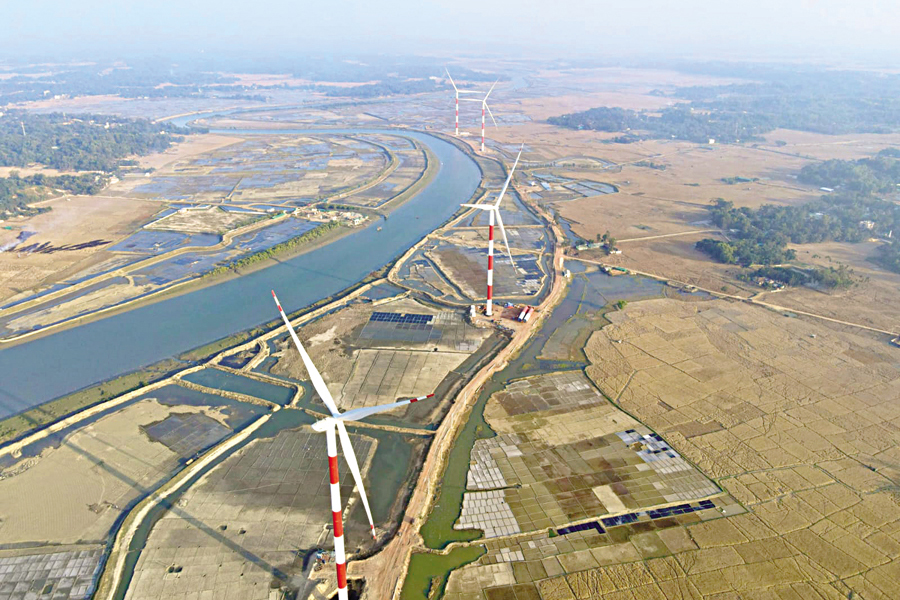
Published :
Updated :

Power China, the builder of Bangladesh's first 60-megawatt (MW) capacity wind power plant, is eyeing to build two new similar plants with a combined capacity of 260MW near the existing one in Cox's Bazar, showing substantial prospects of such renewable energy in the country.
"We have planned to build a 60MW plant at the northern side of the existing one and another 200MW plant at further north," deputy country manager of Power China in Bangladesh Han Kun told the FE during a recent visit at the project site.
Bangladesh has huge prospects in building new wind power plants at different areas, especially in the coastal belts where wind speed is high, he said.
Located at Khurushkul near Cox's Bazar beach, the country's first wind-based plant is now awaiting commercial operation date (COD), project director Mukit Alam Khan said, adding that its reliability test run completed on March 7 last.
Chinese State Power Investment Corporation (SPIC) and Wuling Power Corporation have invested around $116.51 million in the project.
A total of 22 wind turbines, from China's Envision-Energy, have been built on 110-metre tall towers, to generate 3.0MW of electricity from each of the turbines.
A wind speed of at least 3.0 metres per second is required for power generation from such a plant, said Mr Khan. The full capacity of a turbine can be utilised at a wind speed of around 9.0 metres per second or above.
The average wind speed at the project site is around 5.5 metres per second and it drops slightly in winter.

The Bangladesh Power Development Board (BPDB) will purchase electricity from the plant at 12 US cents per unit (1.0 kilowatt-hour) for 18 years from the COD of the plant.
The annual power generation from the plant is expected to be 145.70 million kWh, said Mr Khan.
Power China Chengdu Engineering, China Hydropower Construction Group, International Engineering Co Ltd and Fujian Electric Power Engineering Company are the engineering, procurement and construction (EPC) contractors of the project.
Sources said the US Department of Energy's National Renewable Energy Laboratory (NERL) conducted a study on Bangladesh's wind energy potential several years back.
According to the study styled 'Assessing the Wind Energy Potential in Bangladesh: Enabling Wind Energy Development with Data Products' conducted in 2018, Bangladesh's wind energy potential is at least around 30,000 MW.
"Preliminary results demonstrate that for wind speeds of 5.75-7.75 metre per second, there are over 20,000 square kilometres of land with gross wind potential of over 30,000 MW," concluded the USAID-funded study.
The study found that nine locations across the country had an average wind speed of 5.0-6.0 metres per second at a height of over 60-80 metres above ground level.
"We're doing a feasibility study to build a number of new wind-based power projects on the basis of the NERL study," Sustainable and Renewable Energy Development Authority (SREDA) Chairman Munira Sultana told the FE.
The US-based Institute for Energy Economics and Financial Analysis (IEEFA) calls for an urgent overhaul of Bangladesh's power-sector development with greater integration of renewable energy to enhance its energy security.
The country should aim for renewables to make up 40 per cent of its total power-generation capacity by 2041, a target set by the government, said Shafiqul Alam, an energy finance analyst at IEEFA.
"While once there was a concern over the possibility of utilising wind to generate energy in Bangladesh attributable to the perception that we don't have sufficient wind speed, later on, studies substantiated that Bangladesh could take advantage of wind speed in the coastal belt."
"We're now concentrating on the utilisation of renewable energy," said Mohammad Hossain, director general of the state-run Power Cell.
"The Russian invasion of Ukraine has been an eye-opener, making us want to streamline local energy resources instead of depending on imports alone to meet the country's energy demand."
The big thing is that renewable energy exploitation does not require any import of energy, said Mr Hossain.
Bangladesh has been facing an acute dollar crisis since the beginning of the Russia-Ukraine war in February 2022 mostly due to its over-reliance on energy imports to meet domestic demand.


 For all latest news, follow The Financial Express Google News channel.
For all latest news, follow The Financial Express Google News channel.